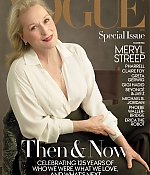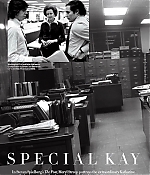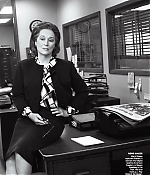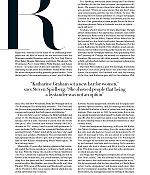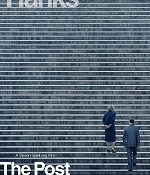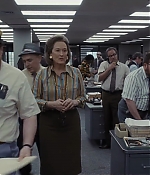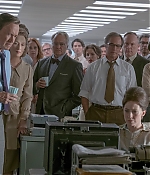|
Simply Streep is your premiere source on Meryl Streep's work on film, television and in the theatre - a career that has won her the praise to be one of the world's greatest working actresses. Created in 1999, we have built an extensive collection to discover Miss Streep's body of work through articles, photos and videos. Enjoy your stay.
|
Celebrating
25 years
of SimplyStreep
|
The National Board of Review today announced their 2017 honorees, with top honors including “The Post” as Best Film of the Year, Greta Gerwig as Best Director of the Year for “Lady Bird”, Tom Hanks as Best Actor of the Year for his performance in “The Post” and Meryl Streep as Best Actress of the Year for her performance in “The Post”. NBR President Annie Schulhof said, “The Post” is a beautifully crafted film that deeply resonates at this moment in time. We are so thrilled to award it our best film as well as to honor the wonderfully talented Greta Gerwig as our Best Director.” These awards are the latest citation of excellence by the National Board of Review, a tradition going back 108 years. This year 265 films were viewed by this select group of film enthusiasts, filmmakers, professionals, academics, students, many of which were followed by in-depth discussions with directors, actors, producers, and screenwriters. The National Board of Review’s awards celebrate excellence in filmmaking with categories that include Best Picture, Best Director, Best Actor and Actress, Best Original and Adapted Screenplay, Breakthrough Performance, and Directorial Debut, as well as signature honors such as the Freedom of Expression and the NBR Spotlight Award. The honorees will be feted at the National Board of Review Awards Gala, hosted by Willie Geist, on Tuesday, January 09, 2018 at Cipriani 42nd Street. This is Meryl Streep’s fifth honor by the National Board of Review. She has won Best Supporting Actress in 1979 for Manhattan, The Seduction of Joe Tynan and Kramer vs. Kramer, Best Actress in 1982 for Sophie’s Choice and two Ensemble awards in 2008 for Doubt and in 2009 for It’s Complicated”.

Thanks to IndieWire‘s Zack Sharf for assembling the first voices from critics who are allowed to speak about “The Post” on Twitter, while full reviews are embargoed until December 06, 2017. Steven Spielberg’s “The Post” is one of the last remaining Oscar contenders set to debut at the end of the year, and early reactions suggest the Pentagon Papers drama is going to be a major awards juggernaut. While we’ll have to wait a few more days for the review embargo to lift, critics who have seen the film have begun sharing their thoughts on social media and the first reactions are mostly glowing, especially in regards to Meryl Streep’s performance. “The Post” centers around the unlikely partnership between The Washington Post’s Katharine Graham (Streep), the first female publisher of a major American newspaper, and editor Ben Bradlee (Tom Hanks), as they race to publish to the Pentagon Papers and reveal the truth about America’s involvement in Vietnam. The movie was co-written by “Spotlight” Oscar winner Josh Singer and features an ensemble cast that includes Alison Brie, Carrie Coon, David Cross, Bruce Greenwood, Tracy Letts, and Bob Odenkirk. IndieWire’s David Ehrlich calls “The Post” Spielberg’s best film since “Munich” and is one of many critics singling out Streep’s lead performance as one of the best of her career. Alissa Wilkinson of Vox says Streep gives her “best performance in ages,” while Peter Sciretta of /Film calls her “amazing.” According to Mark Harris: “I will say that what Meryl Streep does in this movie, building a narrative about her character with each line, move, and gesture, is, even by her standards, astounding.” “The Post” opens in select theaters December 22. Check out a roundup of first reactions after the cut.

A lenghty, very interesting article on “The Post” by The Guardian: It has been described as a Hollywood all-star team’s riposte to Donald Trump. Steven Spielberg’s new film, The Post, headlined by Tom Hanks and Meryl Streep, dramatises the Washington Post’s publication of the classified Pentagon Papers, which exposed government lies about the Vietnam war. But while there are well chronicled parallels between the administrations and obsessions of Trump and Richard Nixon, the movie is also provoking debate about the role of media as watchdog – and whether a similar leak today would survive partisan attempts to discredit the messenger. Spielberg consulted Daniel Ellsberg, the Rand Corporation strategic analyst who leaked the Pentagon Papers – a top-secret 7,000-page document detailing US strategy in south-east Asia from 1945 to 1967 – to New York Times journalist Neil Sheehan in 1971. It was a bombshell that revealed the White House knew it was fighting an unwinnable war. After the Nixon administration won a court injunction that stopped the presses, Ellsberg gave a copy of the documents to the Post and 17 other newspapers. The Times and Post fought the order for 15 days until the supreme court overturned the ban in a 6-3 decision. Justice William Douglas wrote: “The dominant purpose of the first amendment was to prohibit the widespread practice of governmental suppression of embarrassing information.” But the justice department still pursued a vendetta against Ellsberg. He went on trial in 1973 on charges of espionage, conspiracy and stealing government property. The charges were dismissed due to gross governmental misconduct and illegal evidence gathering against him. The Pentagon Papers were declassified in 2011 and released for the public. The complete article can be read over at The Guardian with many thanks to Glenn for the heads-up.
Article courtesy Awards Daily on yesterday’s screening at the Directors Guild of America: The Director’s Guild Of America in Hollywood was packed to the brim last night in anticipation of the new film, The Post. Meryl Streep, Tom Hanks, and Steven Spielberg along with screenwriters Liz Hannah And Josh Singer, Production Designer Rick Carter and Cinematographer Janusz Kaminski attended the post-screening Q&A. Spielberg humbly told the audience that he got all of his first choices for the film. He gave thanks to Ellen Lewis his casting director and said he’d always wanted to work with Bradley Whitford. “It was one of my favorite cast pictures that I’ve ever worked on.” Talking about the 70’s visual language of the film, Spielberg said there wasn’t a lot of time for him to do much pre-visualisation and he relied on his production designer, Rick Carter to present locations that were authentic to the period. He said, “I knew this was a thriller. A new room adventure story and I used a zoom lens.”
On how the era in which [Graham] lived, Streep said: “It was customary in certain circles. When people would have dinner parties and important topics came up the women excused themselves.” Streep replied referring to the dinner scene in the film where the women leave the dinner table when the men start talking about “important issues.” The three-time Oscar winner said she had read the book and spoke to Graham’s son, Don. “She was very uncertain. At work, she had so many people thinking she didn’t deserve to be where she was.” She added, “What the world was like, I try to tell young women how different it was very recently, in those leadership circles.”
Without having time to build sets, Carter found the printing house used by Broadway’s Playbill in White Plain that served as the printing room for the Washington Post. Spielberg said he was surprised to see how it worked and joked that he was obsessed with the printing machine. Hosted by Vanity Fair’s Rebecca Keegan, Streep said of working with Spielberg for the first time was surprised by, “how improvisatory, spontaneous, and living the process of making the movie is.” She joked that while she had never worked with Spielberg before, Hanks had done so, “150 times.” She added, “There was a boys story and a girls story and I felt a little bit isolated and out of the fun. I wasn’t invited to the pie.” She joked before talking about his craft and his camera work. “I got so excited coming to work every day.” The complete article can be read over at Awards Daily.
USA Today reports about the Lincoln Square Q&A with more insights: There’s a reason why Tom Hanks never worked with Meryl Streep before The Post. “I failed my audition for Mamma Mia!” Hanks joked at a panel Sunday night, following the first New York screening of Steven Spielberg’s new movie at AMC Lincoln Square. Somewhat surprisingly, he “never came close (to co-starring with her). I never dreamed that it would be possible.” The Oscar winners certainly picked a timely film for their first vehicle together. Set in 1971, The Post (in select theaters Dec. 22, expands nationwide Jan. 12) centers on the unlikely partnership between The Washington Post’s Katharine “Kay” Graham (Streep), the first female publisher of a major American newspaper, and editor Ben Bradlee (Hanks), as they wrestle to publish the Pentagon Papers, a massive cover-up of government secrets spanning decades. Most of the action takes place over just a few days, with the drama stemming from the Nixon administration’s efforts to stop The Washington Post and The New York Times from printing top-secret information about the Vietnam War. The film’s resonance in the era of “fake news” and journalist bans from White House briefings wasn’t lost on Spielberg, who read Liz Hannah’s script just nine months ago and rushed it into production. “I need a motivational purpose to make any movie,” Spielberg said. “When I read the first draft of the script, this wasn’t something that could wait three years or two years — this was a story I felt we needed to tell today.” The complete article can be read over at USA Today.
“It was a relationship between a man and a woman that wasn’t based on any other feelings. It was a friendship that was so deep, it was like family. The script interested me because it was about the working atmosphere. This is so important right now to think about: the atmosphere in which men and women can deal with each other, especially if the woman is the superior. You see in the scene where she and Bradlee have breakfast, she treats him like he is the boss – and that’s usually how that works. There is an accommodation to the ego of the men.

Steven Spielberg unveiled his latest movie, The Post, in New York City Sunday night with a screening and panel alongside Tom Hanks, Meryl Streep, Bob Odenkirk and Matthew Rhys. You can view the Q&A in the video archive on Simply Streep with many thanks to GoldDerby. The Fox newspaper drama recounts how the Washington Post’s publisher Katharine Graham (Streep) and editor Ben Bradlee (Hanks) teamed up to catch up with The New York Times and publish the Pentagon Papers, risking court sanctions to expose a massive cover-up of government secrets related to the Vietnam War that spanned three decades and four U.S. Presidents. Alison Brie, Carrie Coon, David Cross, Tracy Letts, Sarah Paulson, Jesse Plemons, Michael Stuhlbarg, Bradley Whitford and Zach Woods are among the ensemble cast of the movie, which is dedicated to the late Nora Ephron. Though reviews and social media judgments from those who attended the screening are under strict embargo, the audience at AMC Lincoln Square greeted Spielberg and the cast with a standing ovation. During the post-screening panel, Spielberg outlined how the movie quickly came together over the space of just nine months, from the moment producer Amy Pascal flagged Liz Hannah’s spec script to the movie’s first screening. An in-depth article can be found over at The Hollywood Reporter.
When December cover star Meryl Streep agreed to come to the Vogue offices to be interviewed by Anna Wintour, the questions were swirling. Who would wear the highest heels? The darkest glasses? In fact, the pair had a frank and far-ranging conversation filled with humor and insight. Streep came to discuss her role as Wintour’s friend, the late Katharine Graham, in Steven Spielberg’s new movie, The Post, about the Watergate crisis. Just like Streep, Graham, the publisher of The Washington Post, knew how to say—and do—the right thing at the right time. That was then. This is now: Connecting the dots was a given. Much is revealed in the interview above, between the Pentagon Papers and the Mueller investigation, sexual harassment, female empowerment, and what Meryl and her daughters talk about around the dining room table. Key questions: Will either of these ladies run for office? And which was the most challenging female character Streep ever played? The devil is in the details. The whole interview with Streep can be read on Vogue’s website, alongside the Wintour interview and a slideshow of her most challenging on-screen transformations.

The theatrical trailer has been launched today, and it looks AMAZING! Steven Spielberg directs Meryl Streep and Tom Hanks in The Post, a thrilling drama about the unlikely partnership between The Washington Post’s Katharine Graham (Streep), the first female publisher of a major American newspaper, and editor Ben Bradlee (Hanks), as they race to catch up with The New York Times to expose a massive cover-up of government secrets that spanned three decades and four U.S. Presidents. The two must overcome their differences as they risk their careers – and their very freedom – to help bring long-buried truths to light.
The Post marks the first time Meryl Streep, Tom Hanks and Steven Spielberg have collaborated on a project. In addition to directing, Spielberg produces along with Amy Pascal and Kristie Macosko Krieger. The script was written by Liz Hannah and Josh Singer, and the film features an acclaimed ensemble cast including Alison Brie, Carrie Coon, David Cross, Bruce Greenwood, Tracy Letts, Bob Odenkirk, Sarah Paulson, Jesse Plemons, Matthew Rhys, Michael Stuhlbarg, Bradley Whitford and Zach Woods. You can watch the trailer below and in the video archive. New production stills, on-set pictures, trailer screencaptures and the one-sheet have been added to the photo gallery.
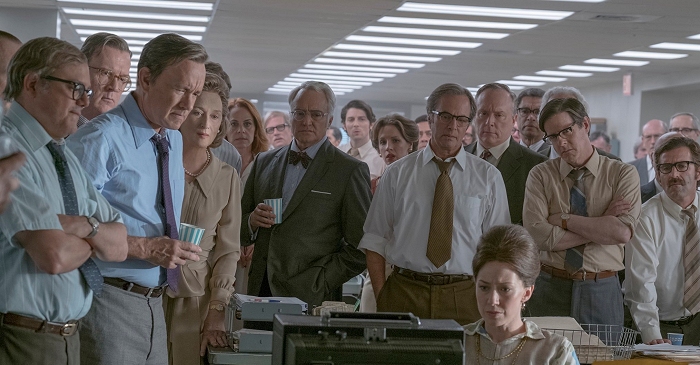
Fotogramas has the first official image of the movie, which brings together an insanely stacked cast – Tom Hanks, Meryl Streep, Alison Brie, Sarah Paulson, Carrie Coon, David Cross, Bruce Greenwood, Tracy Letts, Bob Odenkirk, Jesse Plemons, Michael Stuhlberg, Zach Woods, and Bradley Whitford – to tell the story about the release of the Pentagon Papers in the 1970s, which helped turn around public opinion on the Vietnam War. And yes, there will be some very relevant connections to today’s political climate.
“The film is absolutely Steven’s statement about the importance of vigorous and free press in America. Because we have a President that keeps attacking the press,” “Spielberg” director Susan Lacy told Metro. “…it’s the reason he is making [the film], I mean it is a true story and a historic story, but the reason he chose to make it now is because he feels like it is a message that needs to be out there. I don’t want to speak for him, but I think that’s why he is clearly making this film now,” she added. Sounds like potent stuff, and here’s hoping it’s not too long until the trailer. “The Post” opens on December 22nd.
There isn’t much we know about “The Post” as of now – sure, we know it’s eagerly anticipated and a serious contender for the 2018 awards season, simply because Spielberg, Hanks and Streep are involved. But we don’t really know anything about its storyline, except that it will follow Washington Post publisher Katharine Graham and executive editor Ben Bradlee and their 1971 decision to publish the Pentagon Papers, the leaked government documents about secret escalations during the Vietnam War. From what I’ve read since the project’s announcement, and from the Spielberg films I’ve seen, I was expecting Hanks to lead the picture and Streep playing second fiddle, an important one, but not a central one. But as screenwriter Liz Hannah has told Vulture in an interview, her script puts the focus onKatharine Graham. After reading her autobiography Personal History, “I absolutely fell in love with her,” Hannah says. Given that Graham had enough drama in her life to make “10,000 movies,” the problem was how to write something more than a broad biopic. By using the Pentagon Papers as a turning point, Hannah could zoom in on Graham’s struggle to find her voice – at age 54 – “and to become the person she was really going to be for the rest of her life.” The article also notes that Hannah was partnered with Josh Singer, a veteran screenwriter who won an Oscar for Spotlight, after Spielberg came on board. This sounds really exciting, as does the rest of the article, which can be read here.

